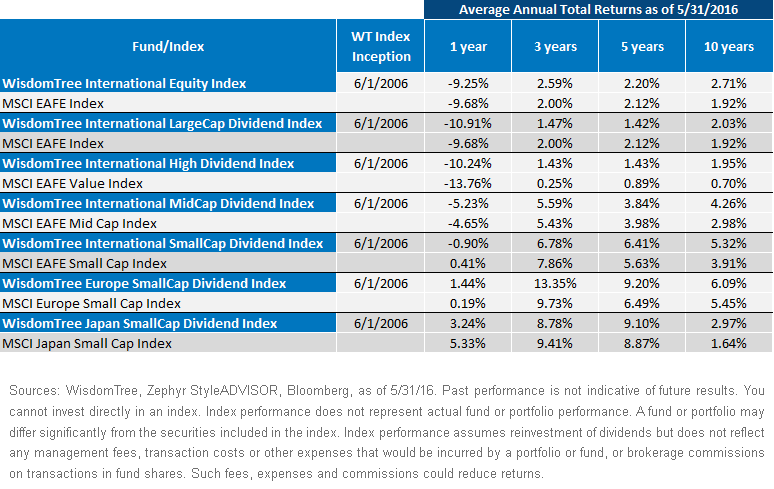WisdomTree’s International Dividend Weighted Indexes: 10 Years of Excellence


 The last 10 years have been a period when developed world stocks have meaningfully underperformed the U.S. equity market. That underperformance reflects the impact of the 2008–2009 financial crisis, the 2010–2012 sovereign debt crisis in Europe and the rally in the U.S. dollar since the summer of 2011. Yet, even in this low-return environment, we observe that:
• In each and every instance, WisdomTree’s international dividend-weighted Indexes beat their comparable cap-weighted peers over the past decade.
• WisdomTree’s broadest Index, the WisdomTree International Equity Index, outperformed the MSCI EAFE Index by 79 basis points (bps), on an annualized basis.
• The WisdomTree International Equity Index, the WisdomTree International High Dividend Index and the WisdomTree Europe SmallCap Dividend Index beat their cap-weighted benchmark in each and every period displayed.
• Similar to what we saw in the U.S., the highest absolute performance for the 10-year period came in the smaller size segment of the market. The Europe SmallCap Dividend Index averaged 6.1% on an annualized basis over the decade, while the WisdomTree International SmallCap Dividend Index averaged 5.3%.
Why Weight Equity Markets by Dividends?
How do we explain WisdomTree’s outperformance relative to cap-weighted indexes? Given that the overwhelming majority of companies pay dividends in the developed world, we believe the answer rests in how we weight the WisdomTree Indexes.
For decades, academics and practitioners were guided by an organizing principle called the Efficient Market Hypothesis. The theory posits that all the information that can be known about a company is already reflected in the stock price, and, therefore, that price is the best unbiased estimate of a firm’s underlying value. If stock prices are efficient, then capitalization-weighted indexes are “mean-variance efficient,” meaning the market portfolio delivers the highest expected return given any level of risk, and the lowest possible risk for any level of return. But if one concedes that stock prices are not efficient or do not always represent underlying fair values, then cap-weighted indexes will not be mean-variance efficient. And if such pricing error persists for months or years, the market portfolio itself can be vulnerable to bubbles because pricing errors are magnified by capitalization weighting and integrated directly into index weights. That means a cap-weighted index is vulnerable to systematically over-weighting overvalued stocks and under-weighting undervalued stocks … whenever and wherever they occur.
Weighting by dividends gives WisdomTree a chance to rebalance back to a measure of relative value once per year. This may help mitigate some of the risk of owning equity markets as price-to-earnings (P/E) ratios expand and weights in cap-weighted indexes tilt toward companies with the largest market values.
Dividends also have theoretical and empirical importance in determining stock values. Historically, the reinvestment of dividends, compounded over time, has provided the majority of the stock market’s real return.1 Dividends reflect the judgment of executives and directors about the cash-generating capacity of the enterprises they lead across the full business cycle, not just the latest quarter. Thus the most recently declared dividend per share may also reflect information about the company that management is aware of but that may not have been disseminated to the wider marketplace.
Based on WisdomTree’s research, weighting by dividends also serves several practical tests. First, dividends are transparent. Unlike accounting data, dividends cannot be manipulated or restated. This makes cash dividends, converted into U.S. dollars, a great common denominator across different geographies, currencies and accounting standards. But weighting by dividends also provided some unique benefits when measured against comparable cap-weighted indexes. Dividend-weighted indexes offer the potential to raise the starting dividend yield on the market, thus giving investors the potential to squeeze additional dividend income out of equity markets. Finally, dividend weighting may also help to lower beta, or market risk, offering the potential for better protection in down markets.
Conclusion
In an environment in which growth stocks have outperformed value stocks over the last decade, in both the United States and the developed world, WisdomTree’s dividend-weighted Indexes have nevertheless outperformed comparable cap-weighted indexes in 11 of 12 major equity segments around the world since 2006. In the developed world, all seven WisdomTree international dividend-weighted Indexes highlighted above outperformed their cap-weighted peers over the last 10 years.
1Source: Professor Jeremy Siegel, “The Future for Investors,” 2005.
The last 10 years have been a period when developed world stocks have meaningfully underperformed the U.S. equity market. That underperformance reflects the impact of the 2008–2009 financial crisis, the 2010–2012 sovereign debt crisis in Europe and the rally in the U.S. dollar since the summer of 2011. Yet, even in this low-return environment, we observe that:
• In each and every instance, WisdomTree’s international dividend-weighted Indexes beat their comparable cap-weighted peers over the past decade.
• WisdomTree’s broadest Index, the WisdomTree International Equity Index, outperformed the MSCI EAFE Index by 79 basis points (bps), on an annualized basis.
• The WisdomTree International Equity Index, the WisdomTree International High Dividend Index and the WisdomTree Europe SmallCap Dividend Index beat their cap-weighted benchmark in each and every period displayed.
• Similar to what we saw in the U.S., the highest absolute performance for the 10-year period came in the smaller size segment of the market. The Europe SmallCap Dividend Index averaged 6.1% on an annualized basis over the decade, while the WisdomTree International SmallCap Dividend Index averaged 5.3%.
Why Weight Equity Markets by Dividends?
How do we explain WisdomTree’s outperformance relative to cap-weighted indexes? Given that the overwhelming majority of companies pay dividends in the developed world, we believe the answer rests in how we weight the WisdomTree Indexes.
For decades, academics and practitioners were guided by an organizing principle called the Efficient Market Hypothesis. The theory posits that all the information that can be known about a company is already reflected in the stock price, and, therefore, that price is the best unbiased estimate of a firm’s underlying value. If stock prices are efficient, then capitalization-weighted indexes are “mean-variance efficient,” meaning the market portfolio delivers the highest expected return given any level of risk, and the lowest possible risk for any level of return. But if one concedes that stock prices are not efficient or do not always represent underlying fair values, then cap-weighted indexes will not be mean-variance efficient. And if such pricing error persists for months or years, the market portfolio itself can be vulnerable to bubbles because pricing errors are magnified by capitalization weighting and integrated directly into index weights. That means a cap-weighted index is vulnerable to systematically over-weighting overvalued stocks and under-weighting undervalued stocks … whenever and wherever they occur.
Weighting by dividends gives WisdomTree a chance to rebalance back to a measure of relative value once per year. This may help mitigate some of the risk of owning equity markets as price-to-earnings (P/E) ratios expand and weights in cap-weighted indexes tilt toward companies with the largest market values.
Dividends also have theoretical and empirical importance in determining stock values. Historically, the reinvestment of dividends, compounded over time, has provided the majority of the stock market’s real return.1 Dividends reflect the judgment of executives and directors about the cash-generating capacity of the enterprises they lead across the full business cycle, not just the latest quarter. Thus the most recently declared dividend per share may also reflect information about the company that management is aware of but that may not have been disseminated to the wider marketplace.
Based on WisdomTree’s research, weighting by dividends also serves several practical tests. First, dividends are transparent. Unlike accounting data, dividends cannot be manipulated or restated. This makes cash dividends, converted into U.S. dollars, a great common denominator across different geographies, currencies and accounting standards. But weighting by dividends also provided some unique benefits when measured against comparable cap-weighted indexes. Dividend-weighted indexes offer the potential to raise the starting dividend yield on the market, thus giving investors the potential to squeeze additional dividend income out of equity markets. Finally, dividend weighting may also help to lower beta, or market risk, offering the potential for better protection in down markets.
Conclusion
In an environment in which growth stocks have outperformed value stocks over the last decade, in both the United States and the developed world, WisdomTree’s dividend-weighted Indexes have nevertheless outperformed comparable cap-weighted indexes in 11 of 12 major equity segments around the world since 2006. In the developed world, all seven WisdomTree international dividend-weighted Indexes highlighted above outperformed their cap-weighted peers over the last 10 years.
1Source: Professor Jeremy Siegel, “The Future for Investors,” 2005.
Important Risks Related to this Article
Dividends are not guaranteed, and a company’s future ability to pay dividends may be limited. A company currently paying dividends may cease paying dividends at any time.


